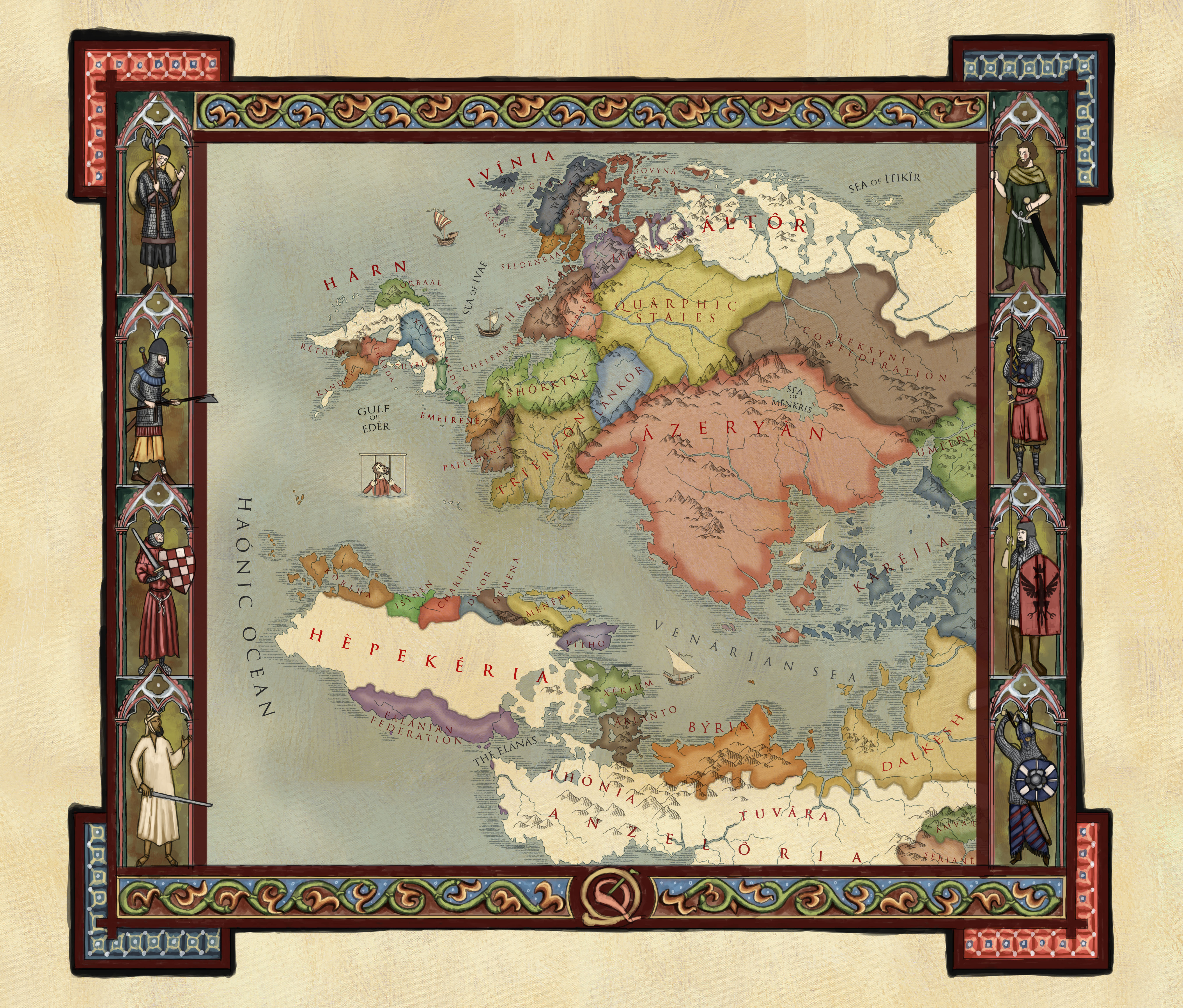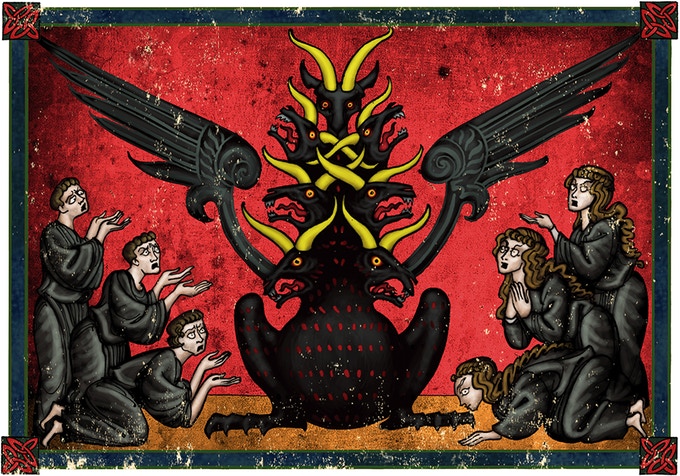- Joined
- Apr 24, 2017
- Messages
- 36,824
- Reaction score
- 109,990
Is the Harn system complex these days?
Harn is systemless, but Harnmaster is crunchy as fuck, yeah
Follow along with the video below to see how to install our site as a web app on your home screen.

Note: This feature currently requires accessing the site using the built-in Safari browser.
Is the Harn system complex these days?
You sir, called my bluff.View attachment 57270
It's an option on the Kickstarter.
It's an organizational thing. They're loose leaf and three hole punched for use in a binder so that when you have new material that expands on an older supplement you can drop them into place in the appropriate binder.You sir, called my bluff.
As much as I like to buy complete series blind on a whim, I'll sit this one out.
Btw what's up with selling loose pages without a binding? Are people asking for this? I'm guessing it's to lower costs but the core rules aren't cheap...
Yeah I remember ad&d 2e did that with the Monstrous manual binder. Can't say I or anyone from back then cared for that drop in "feature".It's an organizational thing. They're loose leaf and three hole punched for use in a binder so that when you have new material that expands on an older supplement you can drop them into place in the appropriate binder.
Yup, I know but I don't think TSR really made their supplements to take advantage of the format. With Harn, they actually number the pages according to where they're meant to be inserted.Yeah I remember ad&d 2e did that with the Monstrous manual binder. Can't say I or anyone from back then cared for that drop in "feature".
There are three main branches of the system. 1e was pretty crunchy, not insanely so. 2e/3e I think should be grouped together, and they simplified some stuff. Harnmaster Gold I think goes back to 1e and then some.Harn is systemless, but Harnmaster is crunchy as fuck, yeah
It's not that different than RuneQuest. The third edition is more streamlined than say RQG, but HMG is perhaps more crunchy. In play, third edition is fairly quick as most of the work is front loaded in character creation.Is the Harn system complex these days?
 )."
)."Yeah, Harn first, then many of these already mentioned. I'd also cheat and include CoC Mythos Earth because, well, you don't get more detail than Earth, and CoC Mythos Earth is just "Earth plus Ancient Aliens (as postulated by ancient astronaut theorists)."
 When Chaosium comes out with the liechtenstein supplement I will concede the point to them.
When Chaosium comes out with the liechtenstein supplement I will concede the point to them.View attachment 57270
It's an option on the Kickstarter.
Resist! There are Bundles of Holding!"It beckons meeeee!", he said in his degenerate collector lizard voice.
... from above.Harn by far. Between Columbia Games and Kelestia nothing else compares.
The Third Imperium, Glorantha, Tekumel, and Ars Magica approach it in scope and level of detail.
To expand on ffilz's point, very much depends on what type of "detail" you're looking for. (Or are scoring, if this is just a forum discussion for the sake of having a forum discussion -- which is fair enough, need to keep ourselves out the way of the traffic...) Geography? Culture? Storylines? Sheer throwweight of material that you can dismay you SO by obsessively hoarding? All valid metrics! ... in their own way.So all this RuneQuest news and discussions had me thinking about which are the most detailed non-D&D rpg settings? Glorantha certainly has to be up there. Harn I'm guessing? What are the mega settings out there? Does not have to be limited to fantasy. I know nothing about WoD Vampire, but there seems to be going alot there setting-wise.
See, you can immediately get the distinction from Glorantha right there. An entire fandom, no continuity disputes.The latter was run by N. Robin Crossby, and the two sides were in dispute for a while over rights, yet it doesn’t seem like they created any type of conflict in the setting canon.
There are three main branches of the system. 1e was pretty crunchy, not insanely so. 2e/3e I think should be grouped together, and they simplified some stuff. Harnmaster Gold I think goes back to 1e and then some.
There is a weird rift in the Harn publishing universe between Columbia Games, which sells 3e, and Kelestia, which sells HMG. The latter was run by N. Robin Crossby, and the two sides were in dispute for a while over rights, yet it doesn’t seem like they created any type of conflict in the setting canon. And now that Crossby is passed on, I don’t know what’s happened. The fans don’t seem to want to take sides.
Golf fans especially confused by this scoring system.Harn is in first place, and no one's in second.
Is the Harn system complex these days?
I couldn't say how well they hit the mark, but the intended european-equivalent time frame is ~1200Harn is really well done but it's basically limited to roughly 10th-11th Century Feudal Britain and maybe a bit of France.
Harn is really well done but it's basically limited to roughly 10th-11th Century Feudal Britain and maybe a bit of France.
So, according to the book I just bought:I couldn't say how well they hit the mark, but the intended european-equivalent time frame is ~1200
While Hârn contains unique cultures and creatures, its closest historical equivalent is 9th to 14th century Britain.
While Hârn contains unique cultures and creatures, its closest historical equivalent is 9th to 14th century Britain.So, according to the book I just bought:
The one area where I think you might need some system knowledge is in the Shek-Pvar (the wizards, who are divided into distinct schools). Do the generic world books explain them well enough that you could write them up in D&D terms?
While Hârn contains unique cultures and creatures, its closest historical equivalent is 9th to 14th century Britain.
Okay. I think people are missing it.
Hârn is an island off the western coast of the region of Venârivè (the northwestern part of the continent of Lýthia) on the planet Kèthîra, but as Hârn has traditionally been the focus of the setting, many people refer to the world as Hârn or HârnWorld. A Significant chunk of the "Harn" material is for the other parts of Kethira (mostly Lythia), which are not 9-14th C Britain.
Harn itself but the world has been greatly expanded especially by KelestiaHarn is really well done but it's basically limited to roughly 10th-11th Century Feudal Britain and maybe a bit of France.
Exactly. Some of these games were just used as excuses for writing exposition dumps in lieu of actually writing games or novels. These "settings" are 99% irrelevant trivia that will never come up in actual play. Much like lore in most fantasy books written by inexperienced writers who think exposition dumps substitute for basics like storytelling and characterization. It's lot more obnoxious in ttrpgs because these are game books supposed to help gamers play games.To expand on ffilz's point, very much depends on what type of "detail" you're looking for. (Or are scoring, if this is just a forum discussion for the sake of having a forum discussion -- which is fair enough, need to keep ourselves out the way of the traffic...) Geography? Culture? Storylines? Sheer throwweight of material that you can dismay you SO by obsessively hoarding? All valid metrics! ... in their own way.
And arguably we should eliminate from consideration all settings that don't include the RW (ideally, the entire known universe!) as a "location" in it...
Yeah, no setting ever beats that. I mean, a single big library's historical section puts all of our shelfies to shame...The real, historical earth.
 !
!Exactly the same tone and tenor as Columbia Games Harn stuff. Just with different lands and different cultures. They focus on Lythia the continent that Harn is part of.Are the Kelestia settings more historical, or fantasy, or somewhere between?

Exactly the same tone and tenor as Columbia Games Harn stuff. Just with different lands and different cultures. They focus on Lythia the continent that Harn is part of.





The setting was mostly solidified in first edition and since then has only received slight revisions and endless rehashes. The actual volume of non-repeated lore is very small. You might as well read a wiki for all the difference it makes.World of Darkness has >100 books detailing just Vampire: the Masquerade 2e/revised. That probably easily takes he cake, yes? Beating out even D&D settings.
Exactly. Some of these games were just used as excuses for writing exposition dumps in lieu of actually writing games or novels. These "settings" are 99% irrelevant trivia that will never come up in actual play. Much like lore in most fantasy books written by inexperienced writers who think exposition dumps substitute for basics like storytelling and characterization. It's lot more obnoxious in ttrpgs because these are game books supposed to help gamers play games.
One of the few exceptions I've found was Nephilim, but only because the past life mechanic meant that the PCs could be personally involved in various historical events. At least in the US version adapted by Chaosium, which went out of its way to include over 60 plot hooks in the Major Arcana book they released just before cancelling the line (and many of these plot hooks were wild: including things like a Jurassic Park pastiche, serial murders committed by Aztec deities, or ending up in an alternate universe after a session of astral projection). The original French version suffered from the irrelevant trivia problem in spades, making most of their supposedly playable factions flimsy and unplayable in practice.
World of Darkness is pretty much the poster child for the "irrelevant trivia written by writers who clearly wanted to write novels and comics instead" problem. All of the published adventures consisted of the PCs watching NPCs solve various metaplot developments that are completely irrelevant to the PCs themselves. Not surprisingly, most fans just bought the books to read the lore dumps rather than actually play the game. The game design itself is... well, it clearly wasn't designed to be played.
After years and years of being subjected to irrelevant lore bloat in pretty much every genre, I'm just completely sick of lore and my eyes gloss over whenever a writer expects me to read their latest irrelevant exposition dump. It doesn't substitute for storytelling, characterization, or game design. I've seen forum discussions go in enough circles to be largely uninterested even from that angle.
What interests me as a player and GM is "how can I use this in an adventure?" If you can't answer that question, then what you're writing isn't viable gaming material. When I write "lore", I think of it in terms of "what do these different groups believe and how does that affect their interactions?" I've gotten a ton of mileage by going Rashomon-style for absolutely everything.
Somewhere inbetween. They are fantasy, but they are deeply rooted in historical cultures.Are the Kelestia settings more historical, or fantasy, or somewhere between?